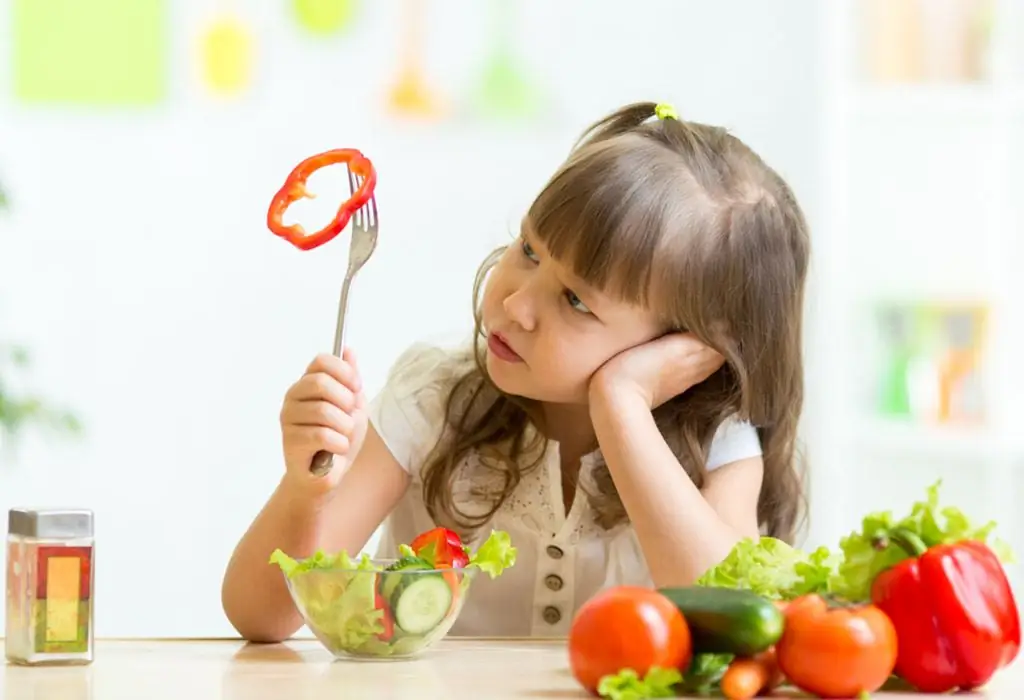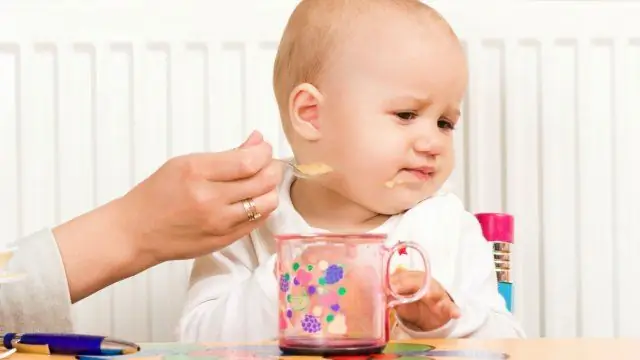2026 Author: Priscilla Miln | miln@babymagazinclub.com. Last modified: 2025-01-22 17:55:13
No wonder parents worry when a child has a poor appetite. Indeed, along with food, a growing organism receives all the necessary set of vitamins and microelements, without which neither normal physical growth nor mental development is possible.

Why is there no appetite?
To help parents, pediatricians, dieticians and even psychologists are paying due attention to this issue. If you combine their efforts, you can identify the main reasons why the child has a poor appetite:
- He is thin, but very energetic and mobile, and an exact copy of his parents - the same miniature, but very active. And he eats normally, it’s just that the body doesn’t need more food, the hereditary factor plays a role here. In this case, doctors advise not to increase the portion, but to diversify the menu so that nutrients are present in it.
- A habitual situation when an obedient but excitable child at the dinner table becomes uncontrollable, stubborn. He begins to put forward various ultimatums, does not want to listen to anyone, but with persuasion and threatsthe situation is only getting worse. There can be many reasons for such behavior. The most common - the baby really wants to attract attention at any cost. In such circumstances, most often, as in a mirror, difficult relationships between parents are reflected, who are constantly busy clarifying the relationship between themselves. But the baby wants attention, and if, even being capricious and refusing to eat, he gets it, then you can sacrifice a delicious dish.

- Child, excessively spoiled by excessive attention, love and care. And that is why it has turned into a capricious little egoist who is sure that whatever he does, he will be forgiven and will continue to be cherished. But nevertheless, internally, a protest against extreme care is ripening in the naughty. He wants to be treated like other children, that is, punishment should follow for whims. And not eating is a great excuse to prove yourself.
- Too harsh parenting makes a child unhappy. Whatever he does, more often than not, punishment follows. But someday the child will want to answer with the same coin. Why, for example, not to punish parents? And in this case, the child's poor appetite is not a refusal to eat, but a response to the cruelty of adults.
Early etiquette
Many parents want their baby to impress those around him with his ability to eat properly, observing etiquette, from a very young age. And an ordinary lunch turns into one long instructive process. The child has to monitor his own posture, chew beautifully, managecutlery, which strive to slip out of weak children's fingers. And in this case, it is better to refuse food than to feel the displeased look of adults and wait for the next notation.

Food stains are no reason to punish
According to psychologists, most often a child's poor appetite is caused precisely by the behavior of adults. Severe punishment for spilled soup or a cutlet on the floor for a long time will instill in the baby the fear of doing something bad that mom will not like. And if dinner periodically turns into a fighting showdown between parents, then the most appetizing dish will seem disgusting to the child.
First of all, parents should control their behavior, showing by their own example that at the dinner table the family is going not only to eat, but also to spend time in a friendly atmosphere.
You can't punish a baby for dropping a spoon or spilling jelly on clothes. But if he learned to hold a spoon correctly, ate everything neatly and thanked for a delicious dinner - this is a great occasion for praise, and this event should be noted by all those present at the table. And to keep the clothes clean, mom needs to take care and buy a small apron or napkin to reliably protect against possible food stains.

But what to do - the child has a poor appetite due to the fact that someone at the table eats too untidy, chews food loudly and splashes liquid dishes? Most often, they can behave this way tooelderly family members due to certain diseases. In this case, you can feed the baby separately, nothing bad will happen, on the contrary, the baby will be comfortable.
Food accompanied by dancing
Often, parents themselves contribute to the appearance of poor appetite when they teach a child to listen to fairy tales, watch cartoons or refuse to eat if he does not hear his favorite song while eating. This is how an ordinary lunch turns into a whole show, when all relatives are involved around the little tyrant, if only the plates are empty, and the little one is fed and satisfied.
After time, he gets so used to such entertainment that there is simply no other way to eat for him, the situation becomes more and more complicated, since one fairy tale may not be enough, and you will need to come up with more and more interesting events, otherwise the refusal to eat will become more categorical.
fun atmosphere.
Negative memories
Appetite disappears even if some very negative memories are associated with food. For example, while eating, the child choked, for a long time he could not clear his throat and inhale fresh air. These negative impressions can deprive the baby of the joy of eating for a long time, even if he has long forgotten what caused the fear.

The same phenomenon may remain after acute poisoning, the symptoms of which are very difficult for a baby to tolerate:
- severe vomiting opens;
- starts with frequent liquid diarrhea that causes pain;
- temperature rises, and if it rises above 40 degrees, convulsions may occur;
- dehydration begins, all useful substances are removed from the body, so the child becomes lethargic, gets tired quickly.
When any illness and just malaise began, these are always good reasons for a child's poor appetite. Then the diet should not only be reduced, but also changed, fed at the request of the patient, but in small and frequent portions so that the stomach does not fill up and vomiting does not occur.
Innovations in the diet
If a child is a year old and poor appetite suddenly turns into a problem, most often the reason can be his intense emotional state:
- new unfamiliar products appear in his life, which he can already appreciate quite consciously;
- he is given new demands while eating, like eating on his own, which is a stressful situation.

If a child's parents have taught a somewhat monotonous food, he may refuse another. And if at home this problem is not particularly visible, then during a trip, at a party or in kindergarten, it will be difficult for the baby to perceive new products, most likely, he will simply refuse them.
New conditions
But ifpoor appetite in a child at 2 years old, this may be due to a visit to the nursery group. Homemade food is more fatty and refined, and if the baby does not prefer the dishes that are offered in a children's institution, it will be much more difficult for him to adapt. It will also be difficult for those children whose parents did not take into account the dietary schedule, since it is difficult for babies at this age to readjust.
Advice to parents
Loss of appetite can manifest itself due to many reasons, and each can subsequently adversely affect he alth. This means that parents from an early age of the child should be patient and calm, and if poor appetite becomes a cause of concern, then observe and find out what caused it. The main thing is patience. With the help of force and coercion, no parent has yet been able to arouse a good appetite in a child. Therefore, such measures are definitely not an option.
Recommended:
The child has no appetite: causes, ways to solve the problem, tips

Parents often think that the child eats very little, and almost all grandmothers consider their grandchildren to be excessively thin and try to feed them as soon as possible. At the same time, the child's body has a developed instinct for self-preservation, so that the baby will eat as much as he needs. But there are cases when the lack of appetite is caused by very specific reasons
What to do if the child does not want to eat? Causes of poor appetite in children and ways to improve it

The problem of poor appetite worries many parents. After all, when a child eats the prescribed portion, it gives mom pleasure. If this does not happen, then the parents begin to persuade the baby to finish eating, asking them to eat a few more spoons. When a child constantly refuses to eat, then over time he may experience weakness, poor weight gain and pain
Child has no appetite

Baby has no appetite? Many parents have experienced this problem. Unfortunately, it is hardly possible to determine immediately and exactly what is causing this. After reading the article, you can understand why your baby refuses to eat
No appetite during pregnancy: causes, consequences, ways to restore appetite

Many people are accustomed to hearing that the expectant mother should eat for two. But very often a woman in anticipation of a baby and for herself alone is not always able to properly eat. A frequent and rather unpleasant phenomenon when there is no appetite during pregnancy. Why is this happening, should you be very worried about it, and most importantly, what to do in such a situation?
What to do if a child has no appetite: causes, effective solutions, advice from pediatricians

An excellent appetite in a child is a guarantee of a good mood for parents. There is nothing more pleasant than watching a baby gobble up a freshly prepared breakfast, lunch or dinner on both cheeks. But more often than not, the opposite is true. The baby flatly refuses to eat what mom or grandmother has prepared. About what to do if the child has no appetite, we will tell in our article. We will definitely dwell on effective methods for solving this issue and present recommendations from the well-known pediatrician Komarovsky E. O

